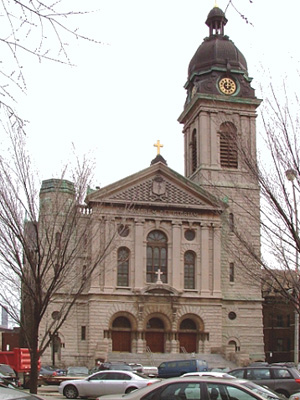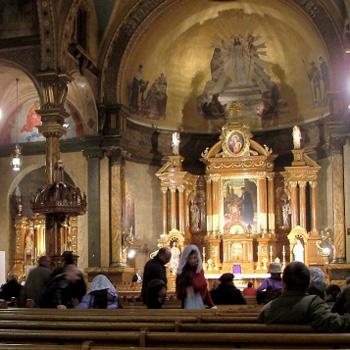 |
||||||||||
 |
||||||||||
|
1232: St John Cantius, Chicago, Illinois, USA Mystery Worshipper: Misericord. The church: St John Cantius, Chicago, Illinois, USA. Denomination: Roman Catholic. The church is administered by the Society of St John Cantius, a religious community founded in 1998 whose mission is to "restore the sacred" – to help Catholics rediscover a profound sense of the sacred through solemn liturgies, devotions, sacred art, sacred music, and instruction in Church heritage. Its members live in community according to the rule of St Augustine. The building: Dating from 1893-1898, this Renaissance/Baroque style building looks like a bit of Rome transplanted to the near northwest side of Chicago. The limestone west front gives way quickly to common brick on the other three sides. The single Baroque style tower rises to 129 feet and houses three large bells that toll a very dignified hour, as well as an amplified electronic carillon that people who live or work in the neighborhood either love or hate. The interior is also Baroque, with much carved wood, lots of painted murals, and a side altar with a very elaborate replica of the Black Madonna of Czestochowa. The church: St John Cantius celebrates the novus ordo mass in both Latin and the vernacular, as well as the Tridentine mass. As might be expected, it is reknown for its excellent liturgical standards. Several organizations are sponsored, such as the St Monica Sodality (promoting return to the Catholic faith through prayer and self-mortification), Confraternity of the Blessed Sacrament, Knights of Columbus, Ladies Rosary Sodality and Legion of Mary, as well as no fewer than four choirs specializing in classical masses, other classical religious works, Renaissance polyphony and Gregorian chant. The neighborhood: This part of the near northwest side was cut up by freeway construction during the 1950s and 60s and has kept its character of being "between things" – between the Loop and Ukranian Village, between affluent and poor, between the Chicago River and the Kennedy Expressway. Recently this area (like so many) has seen new townhouse construction, renovation of existing housing stock, and gentrification, although decaying railroad overpasses, collapsing sidewalks, and a nearby concrete plant keep it looking just gritty and urban enough. The cast: The parish newsletter lists no fewer than eight priests and deacons (when many parishes cannot be staffed with one priest), mostly members of the Society of St John Cantius, but nowhere did it say who celebrated this mass. The date & time: March 1, 2006 (Ash Wednesday), 7.30pm. What was the name of the service? Tridentine High Mass with Imposition of Ashes. How full was the building? It felt pretty full, with maybe 300 people for the fourth mass of the day, but my Chicago Churches and Synagogues lists the seating capacity as 2,000. Did anyone welcome you personally? No. I found an usher and asked him if there was a service sheet, and he seemed not to know what I was asking. Then I found a stack of red paperback booklets entitled Latin-English Missal for Praying the Traditional Mass, which helped with translations. I located the newsletter on my way out. Was your pew comfortable? Fairly comfortable old wood pews with typical drop-down kneelers. How would you describe the pre-service atmosphere? A recitation of the Rosary was in progress when I entered (with about 50 people participating), so that would rank as very prayerful. What were the exact opening words of the service? The first words I actually heard were Kyrie eleison. What books did the congregation use during the service? The aforementioned missal was available, but most people didn't seem to be using anything – nor did they seem to be participating, but rather were "hearing mass", to use the old-fashioned expression. What musical instruments were played? The organ (probably the original four-manual Kilgen) was used only for one hymn. One of the church's four choirs, the all-male schola cantorum, chanted pretty much everything in Latin from a choir loft. A couple of sopranos and altos joined them for the Byrd Ave Verum Corpus. Did anything distract you? I was distracted by the lessons for the day being chanted in Latin with no translation provided. I wondered if this congregation, even though accustomed to a Tridentine mass, actually knew what was being sung. A few small children made the noises that small children will make in church, but that didn't compare with my annoyance at the lack of a proper service sheet. Was the worship stiff-upper-lip, happy clappy, or what? What could be more stiff-upper-lip than an old-style mass? There were smells and bells aplenty, and some graceful touches that would bring memories flooding back to anyone brought up in the Tridentine mass, such as an altar boy "changing the book" from epistle side to gospel side before the reading of the gospel.  Exactly how long was the sermon? 10 minutes. On a scale of 1-10, how good was the preacher? 4 – I thought it was a bit rambling. The celebrant also made a remark I found scandalous and offensive, which I'll elaborate on below in the part about the hellish bits. In a nutshell, what was the sermon about? The celebrant preached on the life of St Sabina, whose feast coincided with Ash Wednesday this year (although both Butler's Lives of the Saints and the Catholic Encyclopedia list St Sabina's feast as August 29), and how he accompanied the Holy Father to the Church of St Sabina in Rome. That church is located on one of Rome's famous hills, and the celebrant likened the Holy Father leading him up that hill to the Lord's leading us up out of bondage during Lent. Which part of the service was like being in heaven? This is one Roman Catholic church which, if it didn't actually write the book on bells and smells, certainly has it memorized. And which part was like being in... er... the other place? The celebrant said during his homily that the sex scandals that have plagued the Catholic Church were caused by our sins (meaning either the sins of the Catholic faithful or all of society's sins). I nearly gasped when he said this, and I still get angry thinking about it in retrospect. Also, the church is not "accessible" – after mass, one rather unsteady old lady had to cling tightly to the railing while with great difficulty she made it down all 20 steps coming out of the west portals. What happened when you hung around after the service looking lost? Some people lingered to pray before the sacrament or an assortment of reliquaries scattered about, but most filed out in relative silence. Latecomers went forward to receive ashes if they had missed them at the beginning. How would you describe the after-service coffee? None expected and none offered. How would you feel about making this church your regular (where 10 = ecstatic, 0 = terminal)? 2 – A nice place to visit, but I wouldn't want to worship there regularly. Did the service make you feel glad to be a Christian? Well, I guess so. And I'm glad that liturgical reforms have made the vernacular mass the norm. What one thing will you remember about all this in seven days' time? That my sins are what caused the church sex scandals. |
|
|
||||||||||||||||||||||||||||||||||||
| More Mystery Worshipper reports | |||||||||||||||||||||||||||||||||||||||
 |
|||||||||||||||||||||||||||||||||||||||






